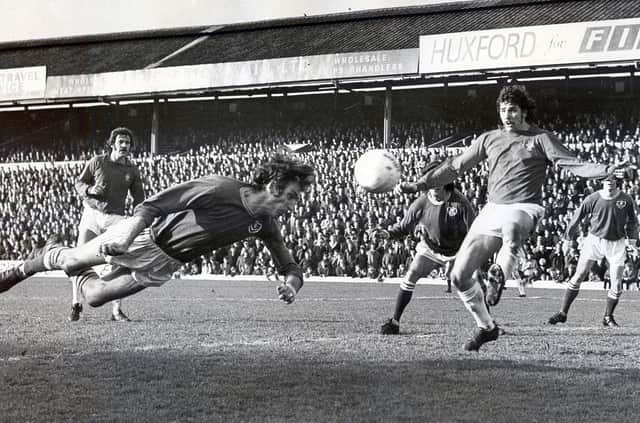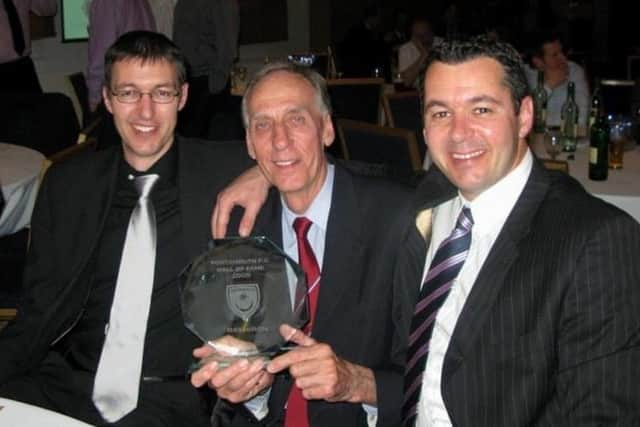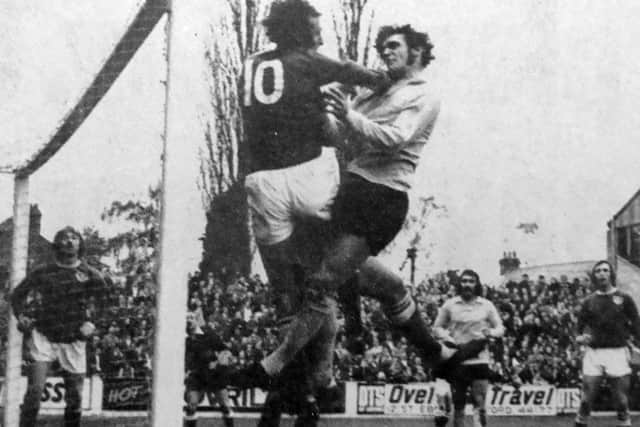Ray Hiron's son on family pride at the goal-scoring great's Portsmouth legacy - and the agonies of a dementia battle


It depicts an airborne Pompey footballer meeting Ken Foggo’s cross with a diving header to spectacularly net during a 2-0 triumph over Nottingham Forest.
Dated February 17, 1973, the framed picture had been presented to Ray Hiron by The News to mark the landmark of registering his 100th Blues goal.
Advertisement
Hide AdAdvertisement
Hide AdUpon the Gosport-born striker’s Fratton Park departure two years later, he had established himself as the sixth-highest scorer in club history, an achievement later earning Hall of Fame recognition.


On Sunday afternoon, the 76-year-old passed away at Ranvilles Nursing & Residential Care Home in Fareham, his address for the last four-and-a-half years following the onset of dementia.
The deterioration had been brutal for his family to witness, a decline which once again strengthens theories of a link between brain damage and professional football.
Son Tony, was aged three when his dad left Pompey for Reading in the summer of 1975, following 364 games and 117 goals.
Advertisement
Hide AdAdvertisement
Hide AdAnd that cherished photograph hangs in his office as a proud reminder of his dad’s footballing feats.


‘That goal was a proud moment for the family, it’s a lovely photo, said the 47-year-old.
‘I have just changed that to my profile pic on Facebook and it has been in my office at work for years, it gets a lot of attention when people walk by and see it.
‘Dad was such a local hero, but growing up as a kid I honestly didn’t realise how highly regarded he was, I was too young.
Advertisement
Hide AdAdvertisement
Hide Ad‘When I grew into a man and had to go out in the big wide world and work and meet people, the name just ignited recognition.
‘They would ask “You’re no relation to Ray Hiron, are you?”. So I would say “Yes, he’s my dad, actually” and the response would be “No way, he’s my hero”. The amount of times I’ve had that conversation is incredible.
‘When I moved into sales, it opened up so many doors for me. Sometimes it’s difficult to break into sales people, to get them wanting to buy from you, but this was a conversation starter.
‘If they’d say “Are you a relation of Ray Hiron?”, your foot is in the door. Having that status has definitely helped my career, without a doubt.
Advertisement
Hide AdAdvertisement
Hide Ad‘I didn’t really appreciate it, but over the years I have collated lots of memorabilia, old programmes, newspaper cuttings which my nan used to collect, she had bags and bags of them she handed down to me and my brother.
‘I’ll be getting them out again. Now dad has passed, I’m going to be making sure I have all the necessary memories which can be passed down through the generations, so everyone knows what a great man and player he was.’
Hiron joined Pompey in 1964 having been spotted playing for Fareham Town.
Employed in the Dockyard, he had to wait until his lunch hour before journeying to Fratton Park to sign that maiden professional contract – travelling on the back of his friend’s motorbike.
Advertisement
Hide AdAdvertisement
Hide AdHe subsequently remained for 11 seasons, establishing himself as a fans’ favourite.
Tony added: ‘‘He is well respected locally through football – he was a great man and a great dad.
‘Dad was very unassuming, he never bigged himself up, just an ordinary guy, while the history books tell you what he was all about in terms of his abilities.
‘I was born in 1972, so I don’t remember him at Pompey because I was too young.
Advertisement
Hide AdAdvertisement
Hide Ad‘My clear recollections of dad playing football were driving from Fareham to Reading in his old Renault on match days and later at Fareham Town, watching him at Cams Alders, where he played before retiring.
‘He ran a local football group called Young Blues with Gordon Stead, around the back of Fratton Park in the gym. He’d help youngsters work on their football skills and a few people over the years have told me “Your dad used to train me, he was a lovely guy”.
‘Later he was duty manager at the Mountbatten Centre when it opened, staying there for years.
‘For a number of years he ran Highland Colts in Fareham, the team me and my brother Steve played for, while later was involved in Gosport Borough Youth, where I was at.
Advertisement
Hide AdAdvertisement
Hide Ad‘Dad was quite a private man, but more than happy to be involved and help people where he could. That was a quality I loved about him.’
When great friend and team-mate John Milkins was inducted into Pompey’s Hall of Fame in 2010, Hiron was asked to make the presentation.
The striker had been part of the first intake the previous year, along with Jimmy Dickinson, Peter Harris, Alan Knight and Guy Whittingham, emphasising the regard supporters had for him.
And, on Sunday, the 122nd birthday of the club he served with such distinction, Hiron passed away.
Tony added: ‘It’s a blessing, dementia is a horrible thing.
Advertisement
Hide AdAdvertisement
Hide Ad‘It’s a slow death and you see the person you know, love and respect disappear in front of your eyes. Physically they are still there, but that’s it.
‘He had probably been suffering with it for seven years. During the early stages you just thought “Silly old fool”, forgetting simple things, and then you quickly realise it’s actually more than that.
‘It was basic stuff he couldn’t compute, he’d repeat himself, often questioning why you were doing certain things, even though it was an everyday action you did all the time.
‘Gradually it ramped up over a period of time and got to a point where he had to go into a home because he was a danger to himself.
Advertisement
Hide AdAdvertisement
Hide Ad‘The stress it put my mum under trying to cope with it made her ill, he just couldn’t function by himself, and we found Ranvilles in Fareham, who we cannot praise enough, he was safe and looked after wonderfully.
‘They had people sat with him when he passed on Sunday, quite peacefully I believe. It was the end of the road for him, he wasn’t able to take on anything any more, it was his time to go.
‘When you look at the amount of people around that era that have suffered with dementia and the nature of the balls they used, I don’t think it’s a coincidence, although I don’t have any medical proof to back it up.
‘It was a slow decline with dad, but you have to try to think of the positives – and I definitely feel he’s in a better place now.’
Comment Guidelines
National World encourages reader discussion on our stories. User feedback, insights and back-and-forth exchanges add a rich layer of context to reporting. Please review our Community Guidelines before commenting.
